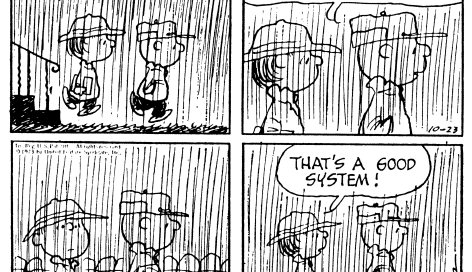Ralbag: A Statement About Rasha v'Tov Lo

Ralbag: A Statement About Rasha v'Tov Lo
Sefer Iyov deals with the question of tzadik v'ra lo (a.k.a. Why do bad things happen to good people?) and rasha v'tov lo (a.k.a. Why do good things happen to bad people?).
The answer to these two questions is "longer than the earth and wider than the sea" (Iyov 11:9), and I wouldn't dare attempt to answer either question in a single blog post. That is why I have titled this "A Statement About Rasha v'Tov Lo." It is not by any means a full answer to the problem of rasha v'tov lo. It is merely a piece of the puzzle - albeit an important one.
This blog post was inspired by Charles Schulz's Peanuts cartoon shown above. Charlie Brown observes that "the rain falls on the just and the unjust," and Linus remarks, "That's a good system."
Upon reading this comic I was reminded of an excerpt from the Ralbag's commentary on Sefer Iyov. [1] After stating his theory on divine providence (which I will not attempt to summarize here), the Ralbag responds to an objection one might make based on the "inequitable" (i.e. unfair) distribution of goods and evils in the world:
Nor does the inequitable distribution of goods and evils among individual men invalidate our theory, as is evident. For on our theory, it does not follow that it is impossible for sinners to receive benefits that are determined by the laws of nature. Indeed, we do maintain that they are left and abandoned to those accidents that are ordered by the laws of nature and that they are not protected by God from the evils that are to befall them, for they are not at the level of perfection such that this [kind] of divine providence could extend to them.
In other words, since sinners are abandoned to the laws of nature, it is entirely possible that they will receive the benefits that accrue from these laws - just as they will suffer the natural harms that befall them. He then goes on to explain how this is in line with Hashem's justice:
That the occurrence of benefits to sinners through the laws of nature is not an evil can be shown as follows. These benefits received by sinners are due to hashgachah klalis (the laws of nature), i.e. are from those patterns that are concerned with man as a species. Therefore, the benefits they receive result from the fact that they are born at a time when the natural forces are in that position which determines that condition; these benefits do not occur because these people are sinners.
It is clear that it is inappropriate for God (may he be blessed) to refrain from providing for the human species by means of this type of providential care, which is necessary for the preservation of the human species, because of the sinners that might exist at that specific time. It would be a moral defect, however, if benefits would accrue to them because of their sins or because of their individual natures.
And just as it would be inappropriate to say that the divine providence exhibited in the divine creation in man of many organs for his preservation (to the utmost degree that is possible) is an evil because this beneficence extends to the sinners despite their debauchery, so too, would it be improper to say that the benefits received by the sinners from the patterns determined by the heavenly bodies constitute an evil. For it is not proper for God (may He be blessed) to refrain from providing for the human species in a general way because of the sinners that might exist. Moreover, it is the nature of God (may He be blessed) to bestow benefits upon existing things as far as this is possible.
In short, just as it is not a moral defect [in God] for non-rational animals, even wild ones, to [enjoy] food and [other] pleasures, so too, it is not a moral defect [in God] if these imaginary benefits are found among sinners, whose level of perfection is comparable to that of the wild animal.
To summarize: Hashem bestows benefits to all of His creatures through the laws of nature. The fact that sinners and evildoers enjoy these benefits is no more unjust than the fact that they receive the benefits of their bodily systems – or the fact that animals enjoy bodily pleasures.
As I said at the beginning of this post, this excerpt from the Ralbag is not meant to fully answer the questions of tzadik v'ra lo and rasha v'tov lo. It is merely an additional piece of the puzzle which brings us one step closer to grasping the fundamental insight of Sefer Iyov "'that My thoughts are not your thoughts, nor are your ways My ways' - saith Hashem" (Yeshayahu 55:8).
[1] Unfortunately, I only have my English translation of this excerpt on my computer. Try as I might, I cannot seem to locate where I found this excerpt in his actual commentary, so I cannot cite a specific source. When I manage to find it, I will cite the exact location. My apologies.



